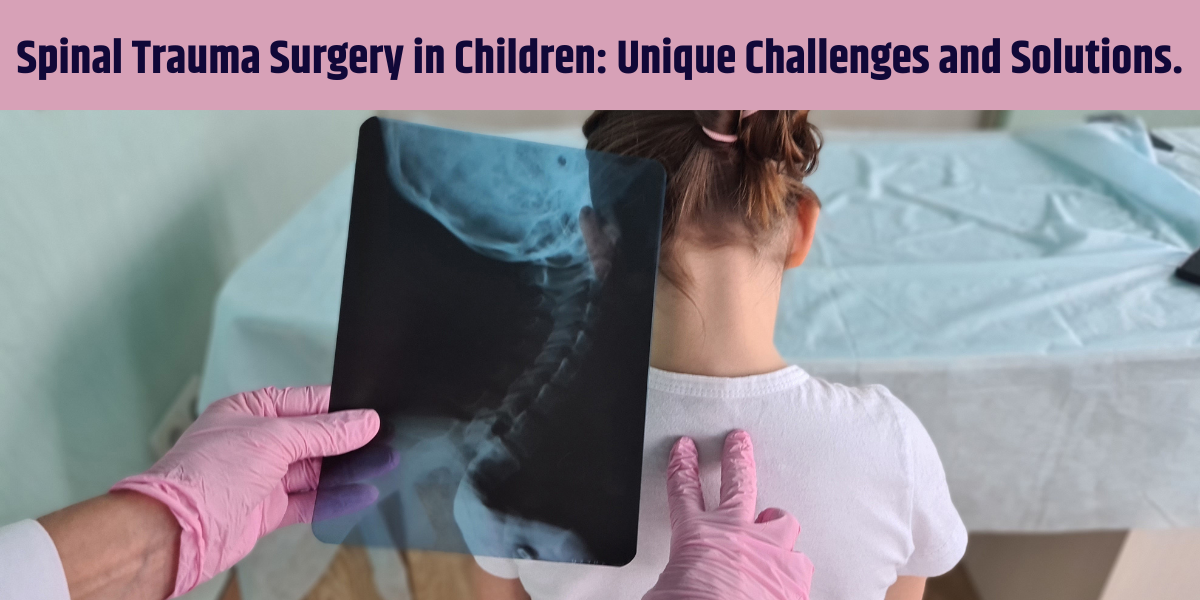Spinal Trauma Surgery in Children: Unique Challenges and Solutions.
Spinal trauma in children requires a specialized approach, particularly when dealing with young patients whose bones and tissues are still developing. Dr. Shrikant Dalal, a highly experienced spine doctor in Pune, is renowned for treating such complex cases with expertise and precision. Below are common questions about spinal trauma surgery in children, along with answers based on expert insights.
What is spinal trauma in children?
Spinal trauma refers to injuries affecting the spinal cord or vertebrae, caused by accidents or falls. Due to their growing bones and flexibility, they face unique risks. According to Dr. Shrikant Dalal, early diagnosis is critical for a full recovery.
How does spinal trauma differ in children compared to adults?
Children’s spines are more flexible and less developed, which may lead to different injury patterns than in adults. For instance, children are more prone to ligamentous injuries due to the elasticity of their spine. Also, because their bones are still growing, fractures may impact future development. Surgeons must consider these factors to ensure long-term stability and functionality.
What are the unique challenges of spinal trauma surgery in children?
Growth considerations: Since children’s bones and spines are still growing, surgeons must be careful to preserve growth plates and ensure that the surgery will not impair spinal growth.
Smaller anatomy: Pediatric patients have smaller and more delicate structures, requiring specialized surgical tools and techniques.
Psychological and emotional impact: Surgery can be daunting for young children. Pediatric surgeons and healthcare teams must take extra steps to reduce anxiety and ensure the child understands the procedure in a way they can comprehend.
Children’s spines are more flexible, and their bones are still developing, which can complicate surgery. Surgeons like Dr. Shrikant Dalal, a leading spine doctor in Pune, are skilled at addressing these challenges by using advanced techniques that ensure both short-term stability and long-term growth.
What are the signs of spinal trauma in children?
Signs of spinal trauma can vary depending on the severity but may include:
Pain in the back or neck
Difficulty moving limbs or weakness
Numbness or tingling in extremities
Loss of bowel or bladder control
Changes in behavior or confusion
If any of these symptoms are present after an injury, immediate medical attention is crucial.
How is spinal trauma diagnosed in children?
Diagnosis begins with a physical exam, followed by imaging tests like X-rays, MRI, or CT scans. Pediatric specialists may also assess neurological function to determine the extent of any spinal cord injury.
What are the surgical options for spinal trauma in children?
Surgical treatment depends on the type and severity of the injury. Common procedures include:
Spinal decompression: Removing pressure from the spinal cord.
Spinal fusion: Stabilizing the spine by fusing vertebrae together, especially in cases where growth plates are affected.
Internal fixation: Using rods, screws, or plates to hold the spine in place during healing.
The surgeon’s approach aims to stabilize the spine while minimizing long-term developmental impacts.
What are the risks of spinal surgery in children?
Like any surgery, spinal trauma surgery carries risks such as infection, bleeding, or nerve damage. In children, the additional risk involves potential interference with bone growth. Therefore, pediatric spine surgeons meticulously plan procedures to avoid future complications.
How do children recover from spinal trauma surgery?
Recovery varies depending on the severity of the injury and the surgery performed. Children typically require a combination of physical therapy, bracing, and rehabilitation to regain strength and mobility. Emotional support and pain management are also critical components of the recovery process.
Can children fully recover from spinal trauma?
With prompt treatment and proper care, many children can recover well from spinal trauma, especially if the injury is addressed early and the surgery is successful. However, severe cases of spinal cord injury may result in long-term mobility issues or disabilities.
What support do families need when their child undergoes spinal trauma surgery?
Families need comprehensive support from medical professionals, including education about the injury, detailed guidance on the recovery process, and emotional care. Ensuring a multidisciplinary team approach comprising surgeons, physiotherapists, and psychologists is crucial to the child’s recovery. Families need comprehensive care, which includes guidance from specialists like Dr. Shrikant Dalal. His extensive experience as a spine doctor in Pune ensures that patients and families receive the best medical advice and support during recovery.
Spinal trauma surgery in children involves unique complexities due to their developing anatomy and the need for long-term growth considerations. Pediatric spine specialists are equipped with the expertise and technology to provide the best outcomes, ensuring that children can lead active, fulfilling lives post-surgery.


